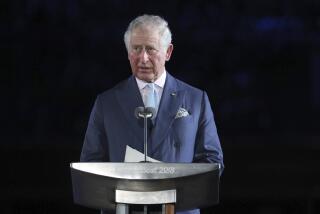Controversy Flares Over King’s Mercy Killing
- Share via
LONDON — The late doctor for the British Royal Family, Lord Dawson of Penn, “had no qualms” about injecting the terminally ill King George V with morphine and cocaine to hasten his death in 1936, a historian said Thursday.
But a biographer of George V, the grandfather of Queen Elizabeth II, called the doctor’s actions “nothing short of murder,” and a expert on the British peerage said the king’s wife, Queen Mary, never would have condoned euthanasia.
The Royal Family refused to comment on the issue. Michael Shea, press secretary to Queen Elizabeth, said, “Our comment is that we have no comment because these events happened a long time ago and the main participants are long dead.”
The issue arose in an article written for the magazine History Today by British historian Francis Watson. He said the 70-year-old king’s doctor administered separate injections of morphine and cocaine about 40 minutes before George V died on Jan. 20, 1936.
Watson, 79, had published a biography of Dawson in 1950, five years after Dawson’s death. Watson said he had not mentioned the lethal injection at the time because he did not want to embarrass the physician’s relatives or the Royal Family.
‘Surprised by Controversy’
He said he decided to disclose the circumstances at this time because it is now 50 years after the king’s death. “I am surprised at the controversy and vehemence it has caused,” Watson said.
“I am certain Dawson was convinced he was acting correctly and I have no doubt he had no qualms about it at all,” Watson told reporters Thursday. He maintained Dawson wanted to ease the suffering of the king, who had recurrent bronchial and heart problems.
But Kenneth Rose, biographer of George V, said Dawson’s actions were “nothing short of murder in the eyes of the law. There is no such thing as mercy killing. Therefore, Dawson committed murder.”
Sir Douglas Black, a former president of the Royal College of Physicians, condemned Lord Dawson’s reported action as “evil.”
Euthanasia, causing death as a means of ending suffering, is illegal in Britain.
Importance of Timing
Watson said the doctor’s notes, now in the archives at Windsor Castle, stressed the importance of the king’s death being announced in the prestigious morning papers, including The Times of London, rather than in the popular evening papers.
“The determination of the time of death of the King’s body had another object in view, viz the importance of the death receiving its first announcement in the morning papers rather than the less appropriate field of the evening journals,” Dawson wrote.
“The papers knew that the end might come before their going to press, and I told my wife on the telephone to advise the Times to hold back publication.”
Iverach McDonald, writer of an official history of the London Times, said he doubted the story.
“From my knowledge of the Times I would be very much surprised if anything of the kind occurred,” he said.
Succeeded by Edward VIII
George V, who reigned for 26 years, was succeeded by his eldest son as King Edward VIII, who abdicated 11 months later to marry American divorcee Wallis Warfield Simpson. King Edward VIII was succeeded by his brother, King George VI, father of the reigning queen. After abdication, Edward became the Duke of Windsor. The duke died in 1972, and the duchess died last April.
Dawson’s notes indicate George V’s wife and his oldest son told Dawson that they did not want the king’s life prolonged if his illness was mortal, Watson said.
But Rose maintained the doctor did not consult with the queen and the then-Prince of Wales about the injections.
“The Royal Family did not want Dawson to strive to keep the king alive if he was obviously dying and in pain,” Rose said. “But they did not intend intentional death.”
Harold Brooks-Baker, publishing director of Burke’s Peerage, said Queen Mary was intensely religious and would not have sanctioned euthanasia.
‘Religion Ruled Life’
“Religion and duty ruled her life. . . . Ordinary pleasures played no part in her life as she did not believe in the easing of life, even in death,” he said.
Watson said from his north London home that Dawson, a former president of the Royal College of Physicians, had planned to disclose the injections in an autobiography, but he died before it was written.
“Dawson felt he had absolutely nothing to hide, and he never once regretted his actions,” Watson said.
In the History Today article, Watson quoted Dawson as writing:
“At about 11 o’clock, it was evident that the last stage might endure for many hours, unknown to the patient, but little comporting with that dignity and serenity which he so richly merited, and which demanded a brief final scene.
“Hours of waiting just for the mechanical end, when all that is really life has departed, only exhausts the onlookers, and keeps them so strained that they cannot avail themselves of the solace of thought, communion or prayer.
“I therefore decided to determine the end.”
More to Read
Sign up for Essential California
The most important California stories and recommendations in your inbox every morning.
You may occasionally receive promotional content from the Los Angeles Times.










